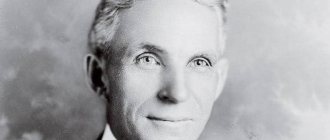Viktor Frankl on the search for the meaning of life
Victor Emil Frankl
- a man who saved thousands of lives. A talented psychiatrist, neurologist and psychologist, he created logotherapy (a branch of existential analysis based on finding the meaning of life for the patient). According to the doctor, suicides, drug addicts and alcoholics are deprived of a goal for which they could live, which leads to tragic consequences.
Frankl named three ways through which a person can make his life more meaningful: creation, gaining new experience and, in fact, finding meaning in life itself, including in suffering. Frankl discovered the last, extreme path while a prisoner of a Nazi concentration camp, where he tried not only to survive himself, but also to help the prisoners. He, as well as other psychologists and social workers who found themselves in Theresienstadt, organized a special help service and created an entire information network, thanks to which they learned about the suicidal tendencies of other death camp prisoners.
“What was to be done? We had to awaken the will to live, to continue existing, to survive imprisonment. But in each case, the courage to live or the weariness of life depended solely on whether the person had faith in the meaning of life, in his life. The motto of all the psychotherapeutic work carried out in the concentration camp can be the words of Nietzsche: “He who knows the “why” of living will overcome almost any “how”.”
,” the doctor recalled in the book “The Will to Meaning.”
Viktor Frankl was liberated on April 27, 1945 by American troops, and in the same year he completed the world-famous monograph “Saying YES to Life.” Psychologist in a concentration camp." We have collected quotes from this and his other works for our material.
| In the era of Freud, the cause of all troubles was considered to be sexual dissatisfaction, but now we are already worried about another problem - disappointment in life. If in Adler's time the typical patient suffered from an inferiority complex, today patients complain mainly of a feeling of inner emptiness that arises from a feeling of the absolute meaninglessness of life. This is what I call an existential vacuum. (“Suffering from the meaninglessness of life. Current psychotherapy”) |
| Even for some minutes, even in some special situations, but humor is also a weapon of the soul in the struggle for self-preservation. After all, it is known that humor, like nothing else, is capable of creating for a person a certain distance between himself and his situation, putting him above the situation, even if, as already mentioned, not for long. (“Say “Yes!” to life. Psychologist in a concentration camp”) |
| Do not set yourself a goal of success - the more you strive for it, making it your goal, the more likely you will miss it. Success, like happiness, cannot be chased; it should happen - and it does - as an unexpected side effect of personal devotion to a great cause, or as a by-product of love and devotion to another person. Happiness should arise naturally, just like success; you must let it arise, but not take care of it... you will live to see how after a long time - a long time, I said! - success will come, and precisely because you forgot to think about it! ("Man's Search for Meaning") |
| Happiness is like a butterfly - the more you catch it, the more it slips away. But if you shift your attention to other things, it will come and sit quietly on your shoulder. ("Man's Search for Meaning") |
| No one has the right to commit lawlessness, even those who suffered from lawlessness, and suffered very cruelly. (“Say “Yes!” to life. Psychologist in a concentration camp”) |
| Live as if you are living for the second time and at the first attempt you ruined everything that could be ruined. ("Memories") |
| Heredity is nothing more than the material from which a person builds himself. They are nothing more than stones that may or may not be used by the builder. But the builder himself is not made of stones. ("Man's Search for Meaning") |
| You must understand that the whole world is a joke. There is no justice, everything happens by chance. Only when you understand this will you agree that it is stupid to take yourself seriously. There is no great purpose in the universe. She simply exists. It doesn’t matter at all what exactly you decide to do in this or that case. ("Man's Search for Meaning") |
| Each creature is given a weapon for self-defense - some have horns, some have hooves, a sting or poison, I have the gift of eloquence. Until my mouth is shut, it’s better not to mess with me. ("Memories") |
| The fact is that I observe the principle: to perform any little things as carefully as the greatest task, and the greatest task with the same calmness as the most insignificant. ("Memories") |
| In inhuman conditions, only those who are focused on the future, who believe in their calling and dream of fulfilling their destiny can survive. ("Man's Search for Meaning") |
| Only love is that final and highest thing that justifies our existence here, that can elevate and strengthen us! (“Say “Yes!” to life. Psychologist in a concentration camp”) |
| If fear turns frightening thoughts into reality, then too strong a desire prevents you from getting what you want. (“Suffering from the meaninglessness of life. Current psychotherapy”) |
| We need to learn it ourselves and explain to those who doubt that it’s not about what we expect from life, but about what it expects from us. (“Say “Yes!” to life. Psychologist in a concentration camp”) |
| I think that for an immature person, the allure of psychiatry lies in the promise of power over others: you can control, you can manipulate people; knowledge is power, and knowledge of mechanisms that non-specialists do not understand, but we have understood in detail, gives us power. ("Memories") |
Aphorisms and quotes by Viktor Frankl
Viktor Frankl (1905–1997): Austrian psychiatrist. Together with other Austrian Jews, he was imprisoned by the Nazis in concentration camps and visited Auschwitz. Based on this experience, he developed the theory of logotherapy, which states that human motivation lies in the “search for meaning.” After the end of World War II, he headed the Vienna Neurological Clinic. He was interested in mountaineering and piloting airplanes.
It is from human imperfection that the irreplaceability and irreplaceability of each individual follows.
You need to approach any situation as if you are living for the second time and in a previous life you have already made a mistake similar to the one you are about to make now.
When we cannot change a situation, we are faced with the challenge of changing ourselves.
By realizing meaning, a person realizes himself. By realizing the meaning contained in suffering, we realize the most human in a person. We gain maturity, we grow, we outgrow ourselves.
The more a person strives for pleasure, the further he moves away from the goal. In other words, the very “pursuit of happiness” interferes with happiness.
Success and happiness should come on their own, and the less you think about them, the more likely it is.
Happiness is like a butterfly. The more you catch it, the more it slips away. But if you shift your attention to other things, it will come and sit quietly on your shoulder.
The meaning of life is just like the meaning of death, everyone has their own, deeply personal.
A person's life is full of meaning until the very end - until his very last breath. And until his consciousness leaves him, he must constantly realize values and bear responsibility.
When the tragedy and suffering of today overshadow all other meanings in life, then we can still find meaning in life by taking a heroic position in relation to our destiny.
Everyone has their own calling or mission in life; each has a specific purpose that requires fulfillment. In this regard, each person is irreplaceable and unique, that is, each person's task is as unique as his special ability to perform it.
There is no situation in which life would not give us the opportunity to find meaning, and there is no person for whom life does not have something ready to do.
A person must shape his destiny, where possible, and - where necessary - accept it with dignity and endure it.
When the tragedy and suffering of today overshadow all other meanings in life, then we can still find meaning in life by taking a heroic position in relation to our destiny.
Until a person knows what exactly determines the uniqueness and fundamental uniqueness of his own existence, he will not be able to feel the fulfillment of his life task as a personally obligatory and inseparable element of his own destiny.
An internal feeling of resentment combined with submission to fate leads to the same result as protest and rebellion against fate.
Fate, that is, everything that has already happened, should always act as an incentive for new, conscious and responsible actions.
Humor gives a person the opportunity to take a distance from anything, including himself.
What would our life be like if it were endless? If we were immortal, we could easily postpone each of our actions for any time.
A person needs to find the best in solitude, to “pluck up the courage” to remain alone. There is creative loneliness, which allows you to turn something negative - the absence of people - into something positive - the opportunity to reflect.
It is not given to a person to know whether another was right when he acted according to his conscience. There can be only one truth, but no one can boast of knowing that it is he and no one else who has this truth.
Suffering makes sense if you yourself become different.
Existential analysis teaches us to perceive life as a “mission”.
Do not set yourself a goal of success - the more you strive for it and make it your goal, the more likely you will miss it. Success, like happiness, cannot be chased. It should be (and is) an unintended side effect of personal dedication to a greater cause.
Love inevitably enriches the one who loves. And if so, there cannot be such a thing as “unrequited, unhappy love.”
They don't deserve love. Love is simply mercy.
Love is the “experience” of another person in all his originality and uniqueness.
More on the topic:
- Quotes from Austrian scientists
- Aphorisms and quotes by Wilhelm Reich
- Aphorisms and quotes by Ludwig Wittgenstein
Popular:
- Man and woman
- Dreams and hopes
- Quotes from "Woe from Wit"
Comments:
Viktor Emil Frankl was born on March 26, 1905, Vienna, Austria-Hungary. Austrian psychiatrist and psychologist. One of the leading representatives of the humanistic trend in psychology. Died September 2, 1997, Vienna, Austria.Aphorisms, quotes, sayings, phrases - Frankl Victor Emil
- Meaning must be found, but cannot be created.
- Lack of success never means loss of meaning.
- Freedom presupposes restrictions and is based on them.
- The influencing meaning penetrates into the conditioning being.
- The realization of meaning always involves making a decision.
- We cannot learn values; we must experience values.
- Motives and instincts push, but reasons and meanings attract.
- If a person wants to come to himself, his path lies through the world.
- The goal of psychotherapy is the healing of the soul, while the goal of religion is the salvation of the soul.
- The meaning of human existence is based on the principle of irreversibility.
- What matters is not our fears or our anxiety, but how we relate to them.
- Each time has its own neuroses - and each time requires its own psychotherapy.
- From the length of life we will never be able to derive a measure of its meaningfulness.
- Suffering's purpose is to protect a person from apathy, from spiritual rigor.
- Spirituality, freedom and responsibility are the three existentials of human existence.
- If all people were ideal, then each person could always be replaced by any other.
- The eternal struggle of a person’s spiritual freedom with his internal and external fate constitutes, in essence, human life.
- Truly human begins in a person where he gains the freedom to resist dependence on his own type.
- The will to meaning is the most human phenomenon, since only an animal is not preoccupied with the meaning of its existence.
- The spiritual, by definition, is freedom in man. A spiritual personality is something in a person that can always object!
- Only to the extent that a person manages to realize the meaning that he finds in the external world does he realize himself.
- It is where we are helpless and hopeless, unable to change the situation, that is where we are called, we feel the need to change ourselves.
- To be human means to always be directed towards something or someone, to devote oneself to a cause to which a person has devoted himself, to a person whom he loves.
- When a person gives in to his cravings, he is precisely giving in to cravings; this means that he freely renounces freedom in order to find an excuse for his lack of freedom.
- The world, as described by many sciences, lacks meaning. This, however, does not mean that the world is devoid of meaning, but only that many sciences are blind to it. Meaning is sacrificed in many sciences.
- Everything can be taken away from a person, except for one thing: the last particle of human freedom - the freedom to choose one's attitude in any given conditions, to choose one's own path.
- Heredity is nothing more than the material from which a person builds himself. They are nothing more than stones that may or may not be used by the builder. But the builder himself is not made of stones.
- We exist insofar as we are open to the world around us. Man is not here to observe and reflect himself; he is here to provide himself, to sacrifice himself, to give himself, knowing and loving.
- Biological destiny is material that takes shape under the influence of the free human spirit, that is, under the influence of that for which, from the point of view of man, he exists.
- If the finiteness factor of life deprived it of meaning, it would not matter when the end would come, whether in the foreseeable future or very, very soon. We would have to admit that the time when everything will end is not significant.
- Life either has meaning, in which case meaning cannot disappear from anything that can happen. Either it does not make sense - but then this also does not depend on the events taking place.
- As Scheler once pointed out, a person has the right to be considered guilty and to be punished. To deny his guilt by explaining that he is a victim of circumstances means to rob him of his human dignity. I would say that it is a person's prerogative to become guilty. Of course, it is also his responsibility to overcome guilt.
- In an age when the Ten Commandments seem to have lost their force for many, man must be prepared to accept the 10,000 commandments embedded in the 10,000 situations with which life confronts him. Then not only will this life itself seem meaningful to him (and meaningful means filled with things to do), but he himself will acquire immunity against conformism and totalitarianism - these two consequences of the existential vacuum










